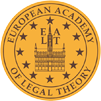General Structure of the Programme
The curriculum consists of 7 modules: Basic Modules A (9 ECTS), B (6 ECTS), C (5 ECTS), and Elective Modules E1-7 (7 ECTS each, 3 to be chosen); the master thesis forms module D (independent research, 16 ECTS). Modules A, B, and C are entirely compulsory. Out of the 7 elective modules, 3 have to be attended successfully; participants are however encouraged to (what is the aim of the curriculum) attend more or less the whole set of modules (optional), thereby profiting most from the inner coherence and richness of the curriculum.
Level/Types of Courses/Study Modules
- A- and B-modules: compulsory main basic courses (jurisprudence historically & systematically; jurisprudence and internationalization of law);
- C-module: compulsory methodology (the link between various approaches in A- and B-courses and reflection/re-consideration of the interdisciplinary context of legal theory) and additional research courses in preparation for the master thesis (research practice)
- D-module: master thesis (independent research)
- E-modules: electives, deepening the basics of jurisprudence taught in A- and B-courses, with a special focus on the philosophy of legal doctrine in various fields of law; in general each elective consists of 1 introductory course (E-a) and 2 advanced seminars (E-b and E-c)
Courses
Module A. Jurisprudence (9 ECTS)
- A1 History of Jurisprudence, 3 ECTS
- A2 Theories of Law, 3 ECTS
- A3 Moral & Political Philosophy of Law, 3 ECTS
Module B. Theory of Comparative & Global Law (6 ECTS)
- B1 Theory of Comparative Law, 3 ECTS
- B2 Theory of Global Law, 3 ECTS
- B3: European Legal Integration, 3 ECTS
Module C: Legal Methods - A Comprehensive Spectrum
- C1: Legal Methods, 1 ECTS
- C2: Logic and Legal Argumentation, 1 ECTS
- C3: Methodology in Legal Research, 3 ECTS
Module D. Master Thesis (Independent Research, 16 ECTS)
Students select a topic for their master thesis within the range of jurispridence and carry out independent research and legal writing in order to develop, draft and submit the final thesis (ranging from 17.000-20.000 words = approx. 50 pages). After completion of the course sessions in spring term, students are free during summer term to complete their thesis at the host university, at another EALT reaserch network (Master's Course "3rd term network") partner institution or at home. The master thesis will be supervised by one or - in case of a dual degree track - two members of the programme's teaching faculty.
Fall Term Electives (E1 and E2, at Frankfurt)
Module E1. Law and History (7 ECTS)
- E1a. E1a History of Law 3 ECTS
- E1b. Legal Anthropology, 2 ECTS
- E1c. Law and Religion, 2 ECTS
Module E2. Legal Anthropology (7 ECTS)
- E2a. Sociology of Law, 3 ECTS
- E2b. Legal Gender Studies, 2 ECTS
- E2c. Law and Literature, 2 ECTS
Module E3. Law, Science and Technology (at Stockholm, 7 ECTS)
- E3a. Epistemology & Legal Informatics: Introduction to Methods, Ideas and Models, 3 ECTS
- E3b. Law, Information and Communication Technology, 2 ECTS
- E3c. Law and Social Media, 2 ECTS
Spring Term Electives
Module E4. Formation of Normative Orders (at GU Frankfurt, 7 ECTS)
- E4a. Global Legal Pluralism – descriptive and normative, 3 ECTS
- E4b. Human Rights and Democracy, 2 ECTS
- E4c. International Justice, 2 ECTS
Module E5. Land and Economy (at Frankfurt, 7 ECTS)
- E5a. Law and Economics, 3 ECTS
- E5b Governance and Compliance, 2 ECTS
- E5c Historical Aspects of Governance, 2 ECTS
Module E6. Global Law (at GU Frankfurt, 7 ECTS)
- E6a. Philosophy of International Law: From Int´l Law to the Birth of Global Law, 3 ECTS
- E6b. Advanced Seminar in Global Legal Theory, 2 ECTS
- E6c. Global Law, 2 ECTS
Module E7. Law, Language, and Reasoning (at EUI Florence, 7 ECTS)
- E7a. Philosophy of Language and Legal Semiotics, 3 ECTS
- E7b. Formal Logic & Legal Argumentation (basic seminar), 2 ECTS
- E7c. Formal Logic & Legal Argumentation (special seminar), 2 ECTS

